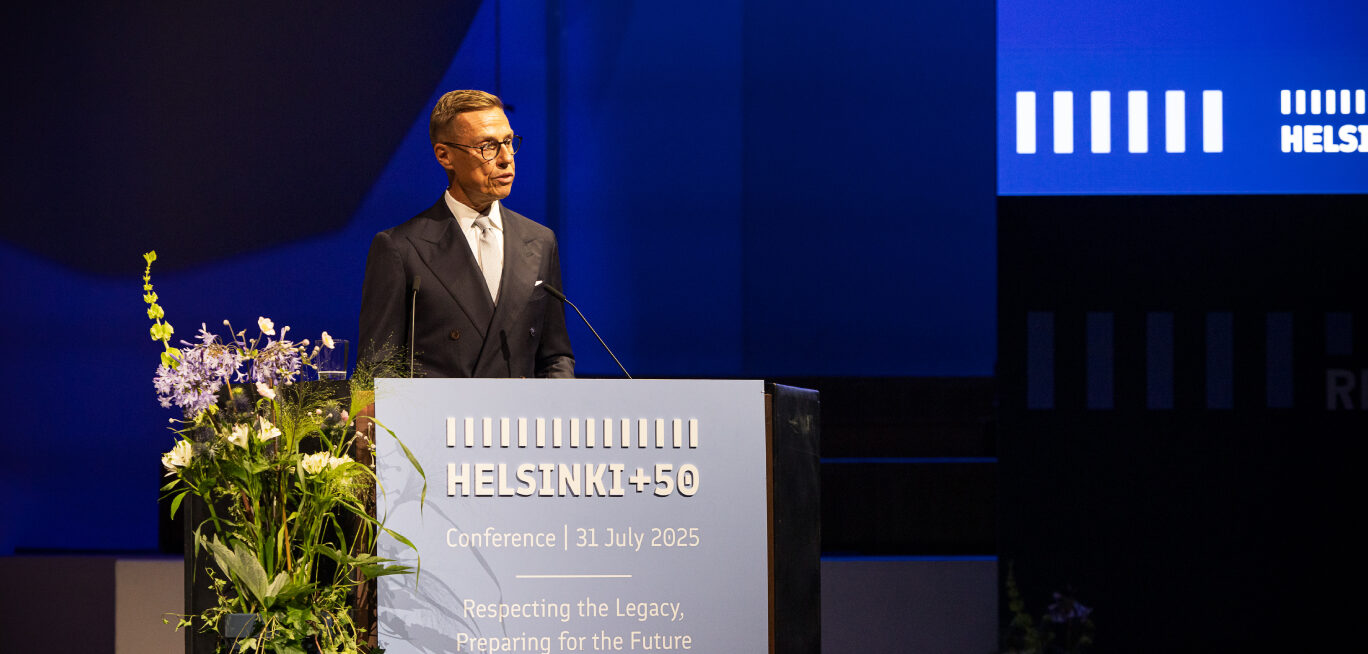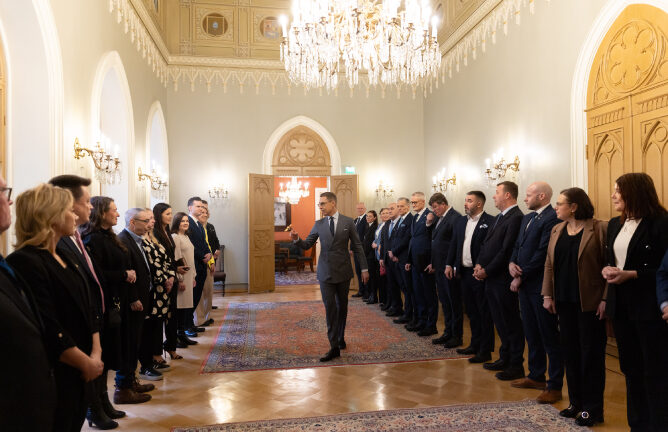Madame President, Mr. President, Mr. Speaker
Dear Ministers, Excellencies, Ladies and Gentlemen,
Dear Friends,
In 2021, my predecessor President Sauli Niinistö proposed the idea of organising a conference to commemorate the 50th anniversary of the Helsinki Final Act and the Conference on Security and Co-operation in Europe. The objective was to honour the spirit of Helsinki and to see how current and future security discussions could benefit from its legacy.
Four years ago, our understanding of the world was quite different from what it is today. Tension was already building. A growing number of world leaders seemed to be relying increasingly on power and coercion to achieve their aims, showing less and less respect for common rules and dialogue.
Still, no one could have imagined that a European country would attack its neighbour, without any provocation, and start a full-scale war in the very heart of Europe. We could not have believed that a European country would try to expand its borders and take decisions on behalf of another country, through the use of force.
But then again let’s be honest with ourselves: Russia began this pattern already in August 2008 when it attacked Georgia. I witnessed it personally when helping to broker the ceasefire in my capacity as Foreign Minister and Chairman of the OSCE at the time.
The 24th of February 2022 marks a turning point in world history. We are living the 1918, 1945 and 1989 moment of our generation. We do not know where exactly the world is going, but we know that it is changing. There is no going back.
Europe has changed as well. Permanently, I would argue. Establishing any form of relations between Russia and the rest of Europe will only be possible after we have achieved a just and lasting peace in Ukraine. However, those new relations will look very different from the relations that existed before Russia started its war of aggression against Ukraine. We cannot turn back the tide of history. Russia violated the basic principles of international law.
***
The role of the OSCE and its predecessor, the CSCE, in shaping European security is closely linked to modern European history. The conferences held here in Finland in 1975, 1992 and now in 2025 reflect different historical moments and their special characteristics.
In 1975, in the Helsinki Conference, we found a new way of building post-war Europe, together. The foundations for peace, the UN and the post-war world order had been laid already in Yalta in 1945. However, Yalta was based on the idea of winners and losers, and spheres of interest of major powers.
The Helsinki Final Act, on the other hand, was not about winners, losers or the use of force. Instead, cooperation was to be built upon common principles, dialogue and mutual respect. This is the essence of the spirit of Helsinki.
We agreed on simple principles that we promised to follow. They included, among others, sovereign equality, respect for the rights inherent in sovereignty, the territorial integrity of states, the inviolability of frontiers and the peaceful settlement of disputes.
We agreed not to regard the future of Europe from the perspective of States only. Instead, we placed citizens, peoples and universal human rights in the centre. To make sure that the principles would hold, civil society in various countries started to get organized. They wanted to hold leaders accountable on the promises they made, and build competencies needed to guarantee those rights.
In 1992, world leaders convened in Helsinki again. The Cold War was over. Capitalism had defeated communism, freedom had defeated control, democracy had defeated autocracy. Foundations were laid for a new institution – the OSCE – that would enable a more systematic promotion of the common principles. The peaceful settlement of disputes emerged as one of the main tasks of the organisation. The OSCE was given an important role as a platform for conflict prevention and resolution.
After the Cold War, the OSCE put human security at the centre of its actions. Security was interpreted broadly, with citizens and their rights at its core. The OSCE and its autonomous institutions achieved remarkable success in protecting minority rights, safeguarding media freedom, developing good governance and defending the rule of law.
Today, in 2025, these achievements – the jointly agreed principles, the comprehensive approach to security and the ability to resolve conflicts peacefully – are under serious threat. At the same time, they are more important than ever before.
Russia’s war of aggression in Ukraine not only breaches the common principles of the OSCE, but the demands by Russia to restrict the national sovereignty of another state challenge the European traditions of democracy and the rule of law in their entirety.
Returning to a world order in which ‘spheres of interest’ dominate would lead to a situation in which the citizens of independent, democratic states would not decide their own affairs. Instead, the undemocratic leadership of another country would make those decisions. Security would no longer be based on people and their rights, but on the projections of power of the regimes of neighbouring countries.
In Europe, we are faced with an important decision. The choice is between Yalta and Helsinki: between the spheres of interest and the use of force – or – the sovereignty of states and common rules and principles.
***
In Finland, the choice is crystal clear. We want to continue building a Europe relying on common rules and principles, through dialogue and cooperation. We also have to walk the talk, and take action.
In Europe, we must defend these principles in everything we do. Breaches of common principles must not be tolerated, and aggression must be responded to. At the same time, we must ensure that the response to aggression does not violate the principles even further. Threats to democracy must not be countered with undemocratic means.
The rules-based multilateral order is challenged globally as well. An increasing number of world leaders want to manage their affairs bilaterally and through ad hoc minilateral arrangements. The threshold for the use of force has become lower and the line between war and peace has become increasingly blurred. The civilians in Gaza, Sudan and many other places are paying too high a price for this breakdown in the rules-based world order. We must also defend the multilateral order and established rules and principles globally, not only here in Europe.
Even though the Helsinki Final Act was signed by states, perhaps its most significant achievements were gained through people and their cooperation. An increased understanding of fundamental human rights, and a willingness to build dialogue with people on the other side of the Iron Curtain, were the key contributors to the Cold War ending peacefully.
I believe that, now and in the future, people, cooperation and dialogue will continue to lie at the core of European security. This conference and the extensive representation from different NGOs reflect the commitment of Finland to develop European security at various levels. We consider citizens and all representatives of civil society to be an essential part of European security as we go forward.
***
I hope that everyone taking part in this conference will find a meaningful way to engage in the discussions, in the spirit of Helsinki. Even though the world has changed significantly in 50 years, the same rules still apply to basic human interaction. The best solutions can be found through dialogue and listening to one another. Joint solutions are harder to find, but they are also much more sustainable.
Dear Friends,
Exactly 50 years ago, here at the Finlandia Hall, President Urho Kekkonen noted that “acknowledging existing facts does not mean submitting to the weaknesses of the present situation”. I agree.
Accepting the facts as they are is the starting point for improving the situation. We all have a role in foreign policy. We all have agency in foreign policy. I encourage everyone to think about and envision what a new common future would look like.
***
I wish you all a successful conference.
Thank you!


